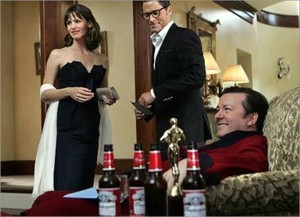Egregious Product Placement: The Invention of Lying
 Despite the fact that I was eager to see The Invention of Lying (I love both Jennifer Garner and Ricky Gervais), it took me until a few days ago to get around to it. I was glad I did–I found the film really entertaining (if somewhat problematic in both content and form–see Matt’s breakdown of one such element here ).
Despite the fact that I was eager to see The Invention of Lying (I love both Jennifer Garner and Ricky Gervais), it took me until a few days ago to get around to it. I was glad I did–I found the film really entertaining (if somewhat problematic in both content and form–see Matt’s breakdown of one such element here ).
But this post isn’t about the film, per se. Rather, it’s about the film’s egregious use of product placement…or rather, the sense of product placement within the film. This post was imagined to note and then analyze the presence of four key brands within the film (Pizza Hut, Budweiser, Coke & Pepsi) as quid-pro-quo product placement of the “We’ll use your brand, you give us money” variety. So let’s start with that.
One key product placement-esque moment within the film comes when Gervais’ character, Mark Bellison, composes and then delivers what are essentially the 10 Commandments as envisioned by a person who just learned he’s the only person on Earth who can lie (or even knows what a lie is). Wanting to have something more weighty than just pieces of paper to read from, Bellison ends up pasting his Commandments to…Pizza Hut boxes. Throughout the ensuing scene, the Pizza Hut logo is featured prominently as Bellison delivers his pronouncements from the steps of his apartment building.  Classic product placement, right? Turns out that’s not exactly what happened in the case of The Invention of Lying.
Classic product placement, right? Turns out that’s not exactly what happened in the case of The Invention of Lying.
After Googling for some support for my analysis, I discovered this piece from Cinema Blend. At the end of the printed interview, Cinema Blend’s Katie Rich asks the film’s screenwriter & co-director Matthew Robinson about the film’s product placement. Robinson’s response: “I think it’s so funny when people say, oh God, there’s so much product placement in the film. We didn’t get a penny.” As it happens, despite the prime real estate afforded to popular brands, no money changed hands.
Perhaps the fact that these products were featured in the film without having paid for the privilege makes it more interesting than simple product placement. Robinson notes in the Cinema Blend interview that, when writing the script, he wanted to lend some authenticity to the world the characters inhabit. Using Pizza Hut and Budweiser, Coke and Pepsi, just made sense. Later, when they tried to get paid for these promotional opportunities, no one would bite–but they left them in. (They’re allowed to do that, because it’s essentially satire, which is protected.) Ultimately, within the context of our current media environment, audiences are left assuming that the presence of these familiar brands within the film is the result of product placement. In fact–do a Google search for “Invention of Lying Pizza Hut” and you get scores of articles referencing the film’s egregious use of product placement (and, incidentally, that Cinema Blend article).
The question remains, though: is that assumption for good or for ill? And for whom?


